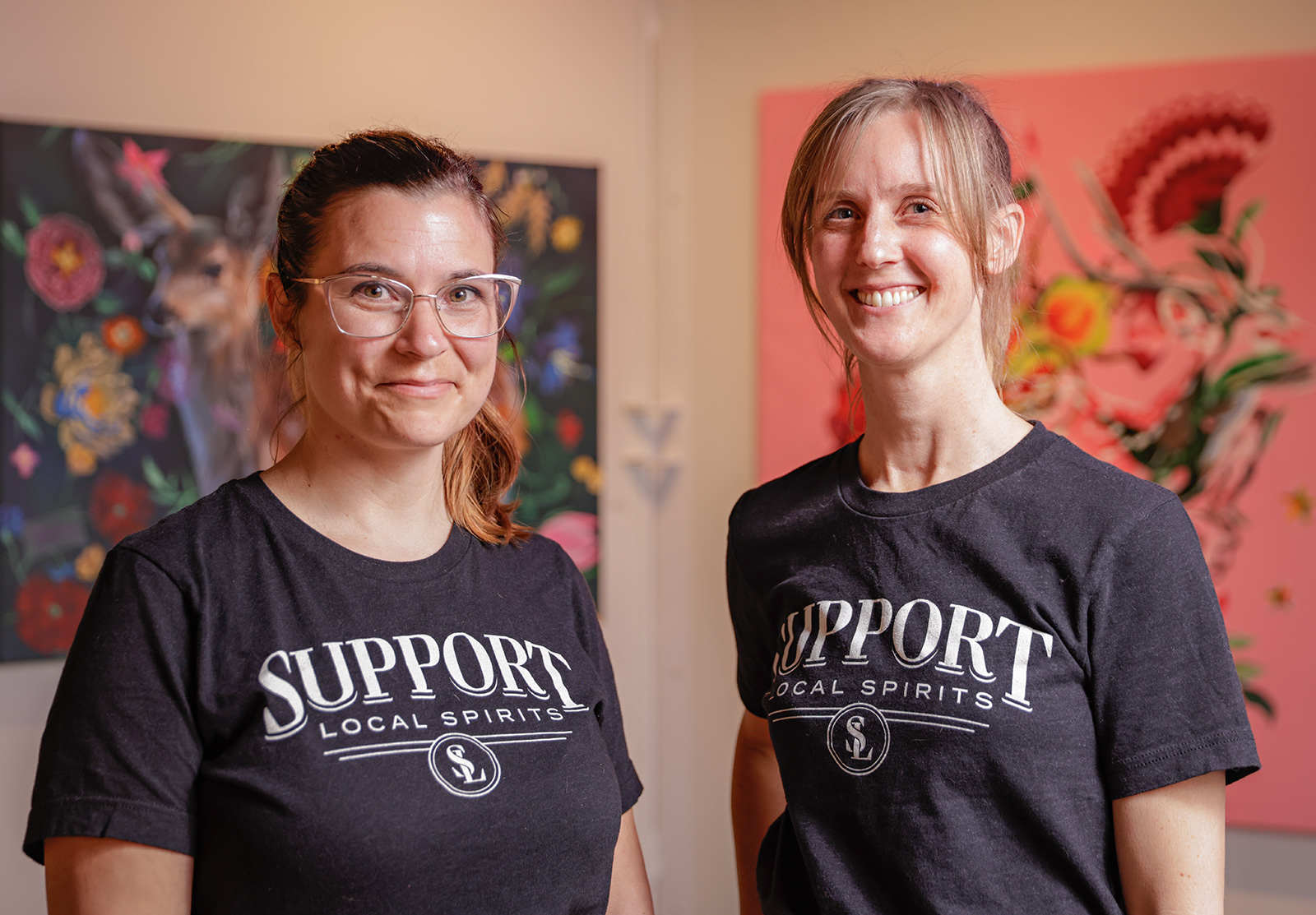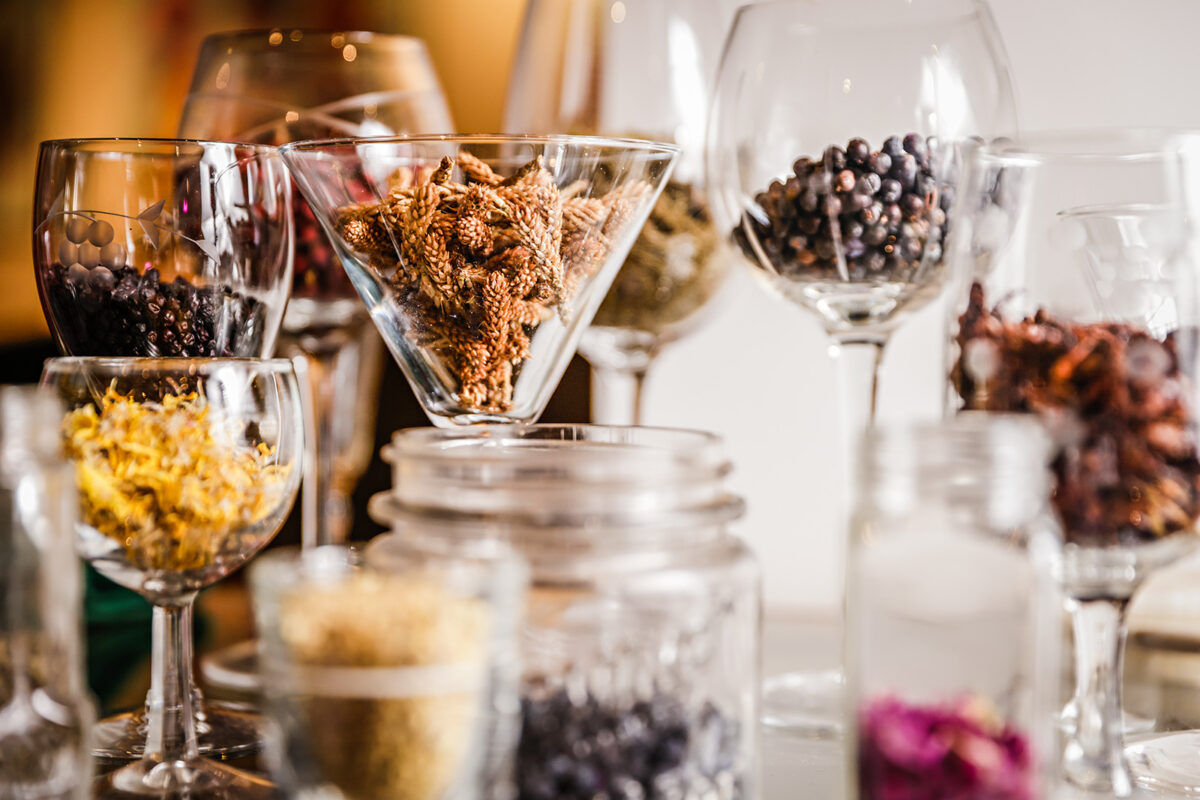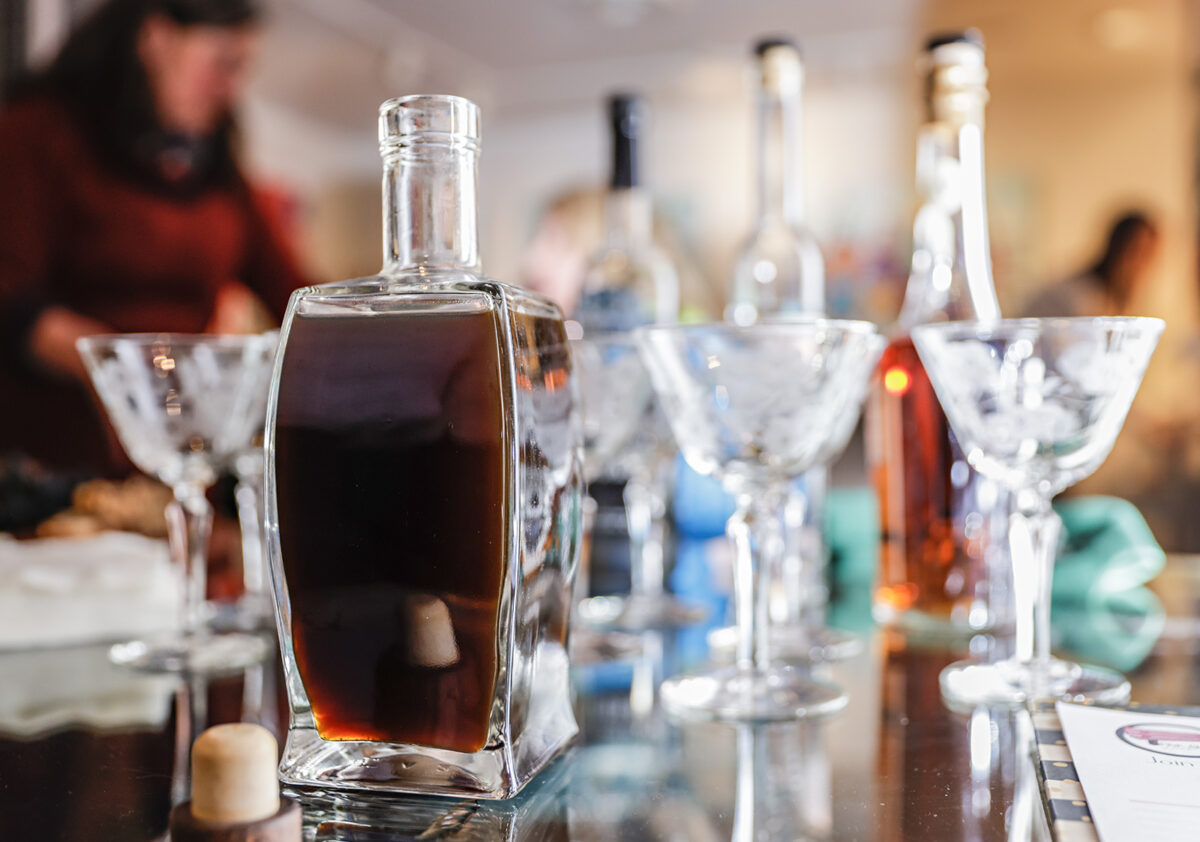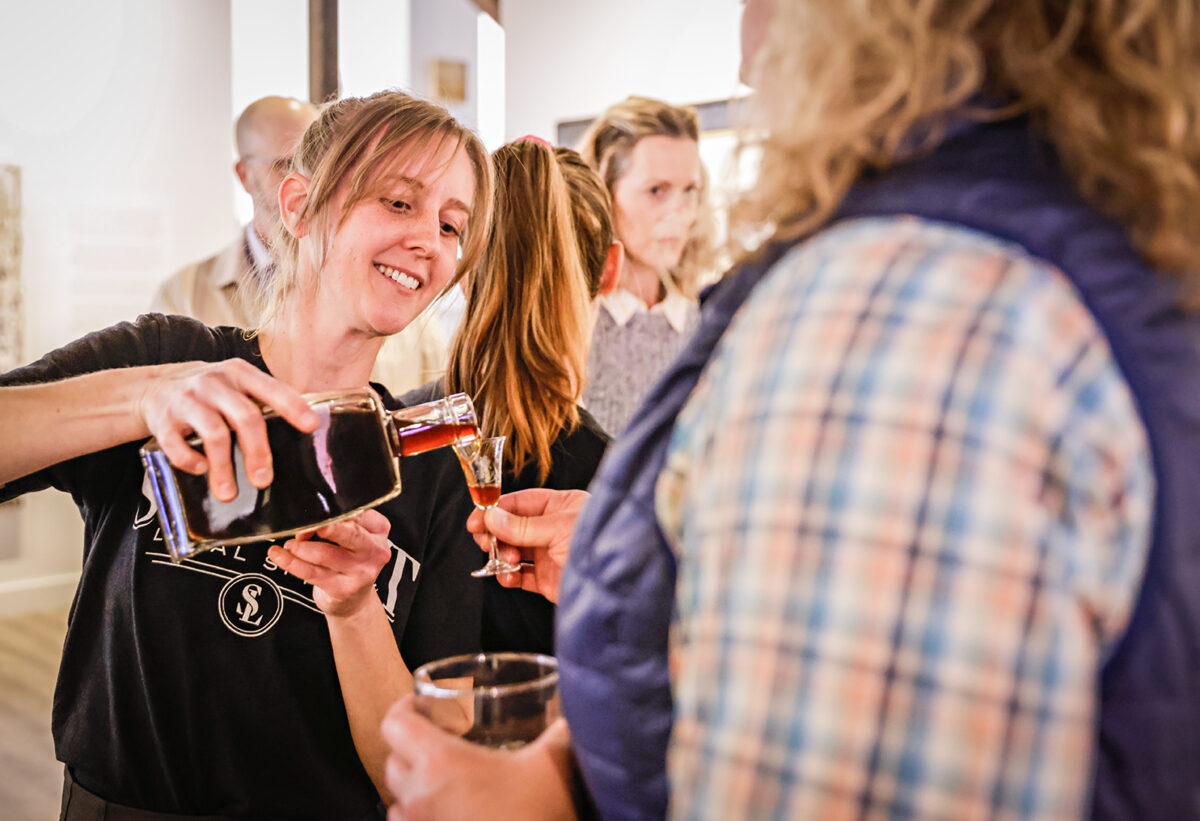Save A Bear. Drink Brandy.
Pink Bench Distilling in Troy is embarking on a three-pronged mission — reduce human-bear conflicts, boost the town’s economy and make delicious spirits
By Micah Drew
When life gives you apples, turn them into brandy and save the bears.
That’s the unofficial tagline for Pink Bench Distilling, a new distillery based in Troy set to launch this summer. The team behind the company, Kristina Boyd and Shawna Kelsey, have spent years wondering how they can leverage their combined wildlife conservation and business backgrounds to minimize conflicts with bears in their community while also giving their town an economic kickstart.
“A lot of craft distilleries bill themselves as a community business, but we’re really working on pushing the limits of that definition,” Kelsey said. “Instead of opening a distillery because we like making spirits, we had a problem in the community and reverse engineered it until we decided this could be a solution.”
Troy is a town of roughly 800 people located along U.S. Highway 2, about 18 miles west of Libby and 15 miles from the Idaho border. The town is surrounded by public land — nearly three-quarters of Lincoln County is National Forest land interspersed with some private timber company holdings. This puts Troy in the center of a wildlife migration corridor for many species, including black bears and the Cabinet-Yaak grizzly bear population, which is estimated between 55-60 individuals.
Due to the community’s immediate proximity to the wildland-urban interface, human-wildlife interactions are a regular occurrence, while the region’s concentration of apple and other fruit trees is a natural draw for bears.
“We have a very forgiving growing environment, so fruit thrives here. We have a ton of apple, plum pear tree here, which are all big attractant for bears,” Kelsey said. “And then we also have a recovering grizzly bear population, lots of black bears, so Troy is really the nexus for potential conflicts. If you have a fruit tree in your yard, a bear can literally wander into your yard, climb the tree and sit in there for a weekend. That doesn’t work out well for the bears, or the people or the trees.”

The prevalence of natural bear attractants got Kelsey and Boyd thinking about how to reduce potential wildlife conflicts in their region. Boyd has spent more than two decades working as a wildlife biologist for various land management agencies and environmental nonprofits, including for Montana Fish, Wildlife and Parks. Part of her work has included teaching communities how to minimize attractants, such as picking ripened fruit.
In 2014, Boyd and Kelsey received a grant to combine a bear aware program with agricultural promotion and launched the Troy Apple Festival in 2015. The festival, which takes place every September, celebrates the local food network and Troy’s fruit growing heritage while teaching locals how to better coexist with their megafauna neighbors. The community works to glean local fruit trees and an on-site cider press lets everyone enjoy the fruit of their labors.
The annual festival draws nearly 600 people, and Kelsey estimates they press around 7,500 pounds of fruit into cider in a single day, in addition to creating a variety of other apple-related goodies.
“But what we’ve realized is that while this helps, it’s not enough,” she said. “There’s way too much fruit out there.”
With more than enough fruit to go around, and a high proportion of it not up to eating or baking standards, it’s still hard to convince people to voluntarily pick their trees clean.
Enter fermentation.
Although an apple-based hard cider seemed the obvious choice for a product, Kelsey’s business acumen and market research, coupled withBoyd’s apple allergy, led the duo to pivot to a harder product: apple brandy.
“The more we looked into it the more we realized the [craft spirits] industry is on an exponential growth pattern in a different way than cider or breweries,” Kelsey said. “Not many distilleries in the state focus on brandy too, so there’s an opening in the market.”
The focus on fruit-forward spirits was the natural theme for the distillery, including brandy and eau-de-vie, a variety of clear fruit brandy,but Boyd and Kelsey also see an opportunity to craft a unique gin using locally foraged botanicals.
“We have this potential for spearheading a sustainable, wild botanical collection program, we have this potential to spearhead incentivizing and improving specialty crops for local agriculture in our area,” Boyd said, adding that they have obtained permits through the Forest Service for collecting dozens of different botanicals. “We can’t grow traditional crops here, but we can do specialty crops, which is what’s in craft spirits. And we grow fruit, it’s all over the place. Plus, there’s no place to get a good cocktail in Troy, so it all just fit together.”

Before taking the plunge and buying a still, Boyd and Kelsey reached out to Danette and Tom Sefcak, the owners of Whitefish Handcrafted Spirits, and made some field trips to Evergreen to learn distilling basics. That mentorship gave them the boost needed to bring Pink Bench to life.
In early 2020, Kelsey and Boyd acquired a 100-year-old building on Troy’s Main Street — which through the years has served as a cat shelter, garment factory, pharmacy, and teenage dance hall — and have been at work morphing it into their distillery and tasting room.
The name, Pink Bench, comes from a community improvement project in Troy where all the city’s benches were painted a brilliant shade of pink, a streak of creativity that brightened the former mining town. One such bench sits outside the new distillery.
The aim is for the distillery and tasting room to be a family friendly establishment with a big outdoor space and potentially some food options. Due to the statewide regulations surrounding micro-distilleries, the tasting room will have a two-shot consumption limit on the premise, an automatic deterrent for overindulgence. There will also be a focus on non-alcoholic options, commonly referred to as mocktails, to allow anyone to enjoy the local flavor. Kelsey said they’ve been experimenting with mocktail recipes, which have been well-received at tastings at local markets.
“People are excited about the products, and are always surprised they don’t have alcohol in them because the flavors are so interesting and complex — and that’s all from the wild, local botanicals that are going to be our staple,” she said.
Among the recipes the duo has experimented with, a dandelion coffee liqueur and mixed-berry liqueur, which uses a mix of wild berries including thimbleberries and Oregon grapes, will make up the first run once they begin distilling.
Further adding to the unique flavor of the business venture, Pink Bench Distilling is also the first Montana company to utilize a community investing structure as a funding source through the platform Crowdfund Montana.
“We didn’t want this to be a hobby and offering the community actual buy-in makes the company so much more likely to succeed,” Kelsey said. “Most of our investors either live in Libby or Troy, and that’s why this connected with them. I mean, we saw the community jump on board with the farmers market and the Apple Festival and we felt like it could happen with this, too.”
Pink Bench Distilling has already received commitments from 48 community investors, totaling nearly $100,000 — 165% of their initial goal. Investors receive some perks including dividends once the business is profitable.
Part of the business plan for Pink Bench centers on a fast launch andbottling for distribution, a way to ensure the distillery’s reach, and revenue, extends beyond the tasting room doors.
“We want to create jobs, reduce bear conflict, create markets for agricultural products, but we also want to bring wealth into the community,” Boyd said. “This is a way to do that because instead of trying to increase tourism, this will be a business that is not dependent on customers coming to town. They can do that, and stop at the tasting room, but we can export this product and bring that income back to our town and to the people who invested in us and support us.”
Pink Bench Distilling is on track to open its tasting room and begin producing locally sourced, small-batch spirits this summer.
“We’ve been planning for this for years,” Kelsey said. “Boy, am I ready to just get in there and start making some drinks.”
To learn more about Pink Bench Distilling’s business plan and community investment opportunity, visit its website here. Kelsey and Boyd will also be on hand at the Montana Distillers Guild Festival at Grouse Mountain Lodge on April 22.
